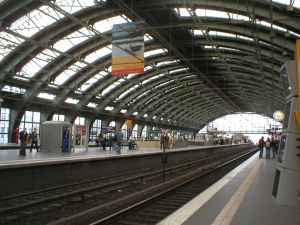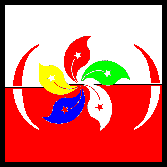Swilatia
| |||||
| Motto: Bogactwo, Wolność, i Jedność (Polish) Wealth, Freedom and Unity (English) | |||||
| National Anthem: none | |||||
| no map available | |||||
| Region | Swilantis | ||||
|---|---|---|---|---|---|
| Capital | Vilvek | ||||
| Largest city | Vilvek | ||||
| Official Language(s) | Polish and English | ||||
| Government | Semi-Presidential Republic | ||||
| - President | Atali Saranisko | ||||
| - Prime minister | Sławomir Tislanne | ||||
| Population | 1 227 739 643 | ||||
| Currency | Swilla (SWSW)
| ||||
| Timezone | UTC +2 to UTC +4 | ||||
| - Summer (DST) | DST not observed | ||||
| Internet TLD | .swi, .sw | ||||
| Calling code | +794
| ||||
| ISO Code | SWLA
| ||||
| NS Sunset XML | |||||
This article is in the middle of a overhaul, additional sections will eventually be added.
The Democratic Capitalist Empire of Swilatia is a an economically powerful nation renowned for being very overpopupalted. Its hard-working, intelligent citizens are ruled by massive bureacracies that are really all just puppets of the nation's many massive corporations. Well-off citizens have access to many world-class goods and services, but the poor are usually starving, and being told by the government that it would not be happening if they got themselves a real job.
Contents
Population
Ethnicity
According to the 2005 census, the population was found to be 1 227 739 643 Swilatian citizens, and it is estimates that there are 425 million legal and illegal immigrants in the country, most of which live in one of the country's large cities. While indigenous Swilatians are the largest ethnic group, they still form only 40% of the population, which is composed of people of many different ethncities, mostly due to the great distances to which the former Swilatian Emipre and its sphere of influence extended to, and also due to mass immigration to the country in recent times. The other major ethnic groups are Eastern Europeans (27%), Western Europeans (16%), Khenians (8%). The remaining 9% is composed of many other ethnicities, some of which do not even form as little as 1% of Swilatia's Population.
Life Expectancy
The average life expectancy in Swilatia is very high, and is at as much as 85 for the upper and middle classes, but it is not very high for the lower class, for which the exact average is unknown. This is mostly because while the healthcare system in Swilatia meets very high standards, it is fully privatised, and it is sometimes difficult for the lower class to get access to certain healthcare services, especially with the country's complete lack of social welfare.
Urban-Rural Distribution
Swilatia is one of the world's most urbanised nations, with more than 75% of the population living in an urban area. To break down the urban population, 22% live in a major city, 47% Live in a major city's ring of smaller cities, and 31% live in other urban areas. The reaming population lives mostly in transition areas, with very few people living in rural areas. Most immigrants live in major cities, but the exact city often depends on how much the climate in which the city is in resembles the climate of the nation which the immigrant comes from.
Swilatian cites are usually very disorganised, with the absence of any "blocks" or other standard street patterns. Most of the cities expand in all directions, with many skyscapers in the cities, and smaller cities on all sides, with the only major city that is an exception being Serelian, which cannot expand outwards as it is located on an island. Usually a city's districts are grouped into the city centre, and surrounding "rings", which are numbered and increase as you go further away from the city centre. Generally, the lower the ring, the higher the property costs, but it is uncommon for much of the population to live in the city centre.
Culture
Holidays
The following is a list of the major national holidays in Swilatia.
| Date | English Name | Polish Name |
|---|---|---|
| 1 January | New Year's Day | Nowy Rok |
| 17 April | Swilatian Democracy Day | Święto Demokracji |
| 21 June | Summer Solstice | Początek Lata |
| 5 August | Swilatia Day | Święto Narodowe |
| 21 December | Winter Solstice | Początek Zimy |
| 31 December | New Year's Eve | Noc Sylwestrowa |
(to be expanded)
Religion
Swilatians have many freedoms granted to them by their country's consitution, and freedom of religion is one of them. Over three quarters of the population considers themselves to be atheists, and much of the non-atheist population do not care that much about the teachings of their religion. However, many different religions are seen the non-atheist part of Swilatia's population, such as Frinastism, Christianity, Buddhism, Hinduism, and lots of others.
Suffrage
Univeral Suffrage in Swailatia is 13 years of age.
Sports
Swilatians generally enjoy playing or watching sports, and it has been this way since Swilatia first started to exist. The national sport is Pakasa, however, it is not the most popular. The most popular sport in Swilatia is football, and this is shown by the Swilatia Cup, on of the largest and most-watched domestic football championships in the world. The country also has a national football team, but they have not yet qualified for a single world cup at this time.
Education
Swilatis's education system has many sharp differences from those of other modern countries, as it is largely nominted by private schools, rather then public schools. In fact, there is no government involvement or regulation at all. No funding, no compulsory education laws, no standardisation of anything. Standards can be as low as 60%, and obvious result of Swilatia being one of the world's most liberal countries. This has led to some complaints from foreigners that the system does not work well, but the government will not intervene, as it believes there should be as little regulation as possible.
Economy
Swilatia is widely thought of as an economic superpower, and has one of the most powerful economies in the NationStates world.
Swilatia is considered to be one of the few capitalizt countries in the world due to the complete absence of government regulations on the market, and the fact that all industries such as transport, telecommunications, energy, and even postal service are fully privatised in Swilatia although such industries are state-owned in most countrie. This has sparked criticisms of the country by people from many other countries, as this means no environmental protection, labour, and product safety laws, and these are considered imprtant things by certain countries. Also, most industries have several corporations in them, and monopolies are almost completely unknown in Swilatia.
Even though there is no social welfare, there is little poverty or unemployment in the country, with unemployment rates being as low as just 3%. However, they are not unkown, and every city has a district, or at least part of a district, which is considered a slum, and usually avoided, and due to the absence of social welfare this is not likely to change.
Transport

Swilatia has a very large, efficient, and highly developed transport system, with vast networks of roads and railways, and an airport in almost every large or medium-sized city, as well as some marine routes in the Swilatian Islands region. Also, the countries transport network, down to every road, rail, and marine route, is fully privatised, and so is every airline and every airport in Swilatia.
Air Transport
Swilatia has an international airport in almost all large cities, but only six of them are major international hubs. These are; Vilvek Atali Saranisko International Airport, Vilvek White Creek Airport, Atlius Swillius I International Airport, Wenesia-Barsenulia International Airport, Nitsolna International Airport, and Serelian International Airport. On average, over 150 million domestic and international passengers are handled by Swilatian airports every day.
Railways
Railways are usually conidered to be the main method of inter-city travel in Swilatia. The system is even more vast then the country's road stystem, and transports copious amounts of passengers every day. The main railway company is Swilatian Rail, although there are many others for both long-distance and short-distance travel. While inter-city links are almost always high-speed (the exception is when the cities are close toghether, but then it's not really classified as an InterCity), but absolutely none of the track in Swilatia has MAGLEV capability.
Roadways
Swilatia has a vast and high quality road network, which was originally designed to provide links between the country's major cities. However, very few Swilatians actually use the roads for this purpose, and instead the roads are used by most Swilatians only for short-distance travel. Because of this, the country's expressways have started to appear like, and be used as normal streets, with buildings and footpaths on both sides of the road, although they still stand out due to width and the presence of toll booths. This is true even outside of large cities.
History
Main Article: History of Swilatia
Originally, the land on which Swilatia exists was a very forbidding place, inhabited by many warring, nomadic tribes. There was total chaos in the region, until under the leadership of Swillius, the Vilveska tribe settled down, and conquered many of the other tribes. United, the tribes created a vast empire, perhaps the largest of the time.
However, this empire did not last very long, and after the death of Swillius, the empire began to shrink, and once again became a chaotic place, as there was no leader. there were many attempts to save the empire, although it mostly did not go well, and it seemed that the empire was doomed, until a monarchy was started to rule over what was left of Swilatia, and managed to save the country, and secure the position, so that there would never again be a time that Swilatia is without a leader.
This Monarchy was stable enough to last for Hundreds of years, although that did not mean there were always easy times for Swilatia. Also, by the 1810's Swilatians were seeing a democratic system work very well in other countries, and the monarchy was starting to get rather corrupt. Both of these factors led the people of Swilatia against the monarchy, and in 1819, a revolution started.


